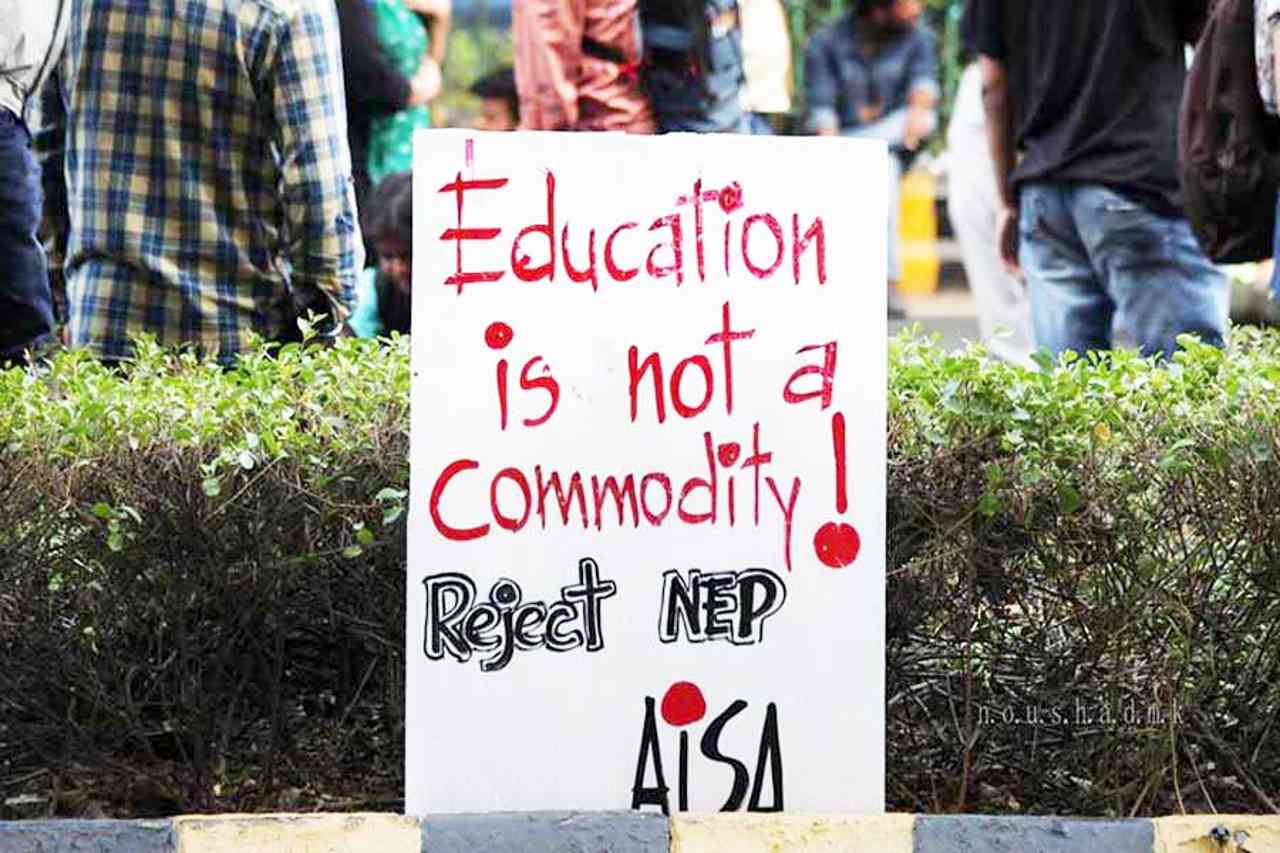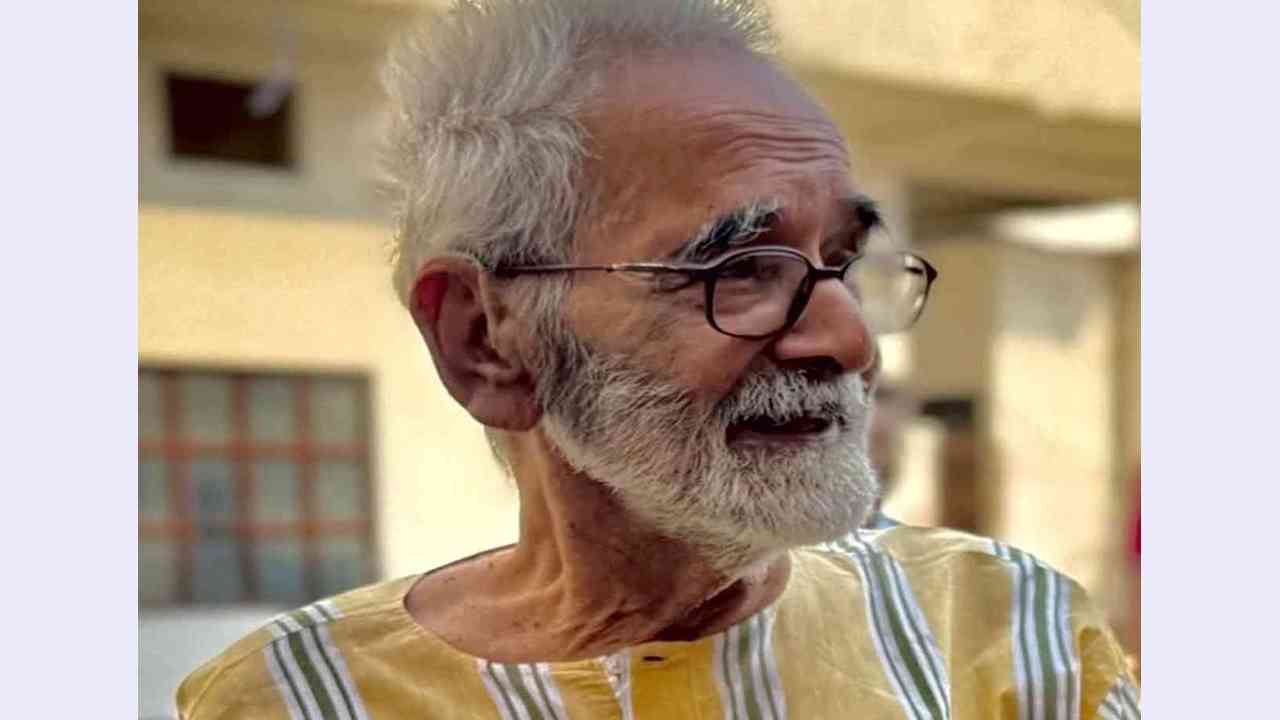The second term of Modi government from 2019 till date represents a complete destruction of public funded education and institutions governing them into a centralised, corporatised and communalised model that stands against policies of inclusive, affordable, and accessible education.
Syllabus Changes: Threat to Plural Education and Academic Freedom
Efforts are being made to falsify history through deletion of chapters concerning the Mughal period, Gujarat riots and democratic movements. The government is trying to untrain students in democracy and constitutional ethos by removing relevant texts and related chapters. It is also infusing propaganda by adding chapters on Savarkar, Golwakar and other icons of Sangh Parivar who sided with the British colonial legacy, propagated, and institutionalised the politics of hate that the Hindutva fascist ideology symbolises.
Recently we have seen how departments in Delhi University and other universities were forced to close courses on caste, gender, and other forms of discriminations. These are being done in the name of reform. However, the changes that are suggested will end up entrenching the existing unequal structures that promote discrimination.
Loan based Education Model and death of Social Justice
The public funded model now stands decimated with the National Education Policy (NEP) unilaterally imposed on students and teachers without any discussion in parliament. The NEP seeks to put in place a loan-based education model. Universities and institutes now need to raise loans from banks through Higher Education Funding Authority (HEFA) and students must repay them by taking loans from banks through increased fees and cost of education. Similarly, the hard-attained policies of social justice stand destroyed with NEP 2020 due to its push for corporate takeover of higher education where policies of reservation are not applicable. The document does not even mention reservations even once in the whole text. The promotion of public-private-philanthropic education model opens avenues for corporates to start universities. If earlier policies promoted privatisation of education, NEP 2020 goes a further step in corporatising education and in institutionalizing privatized education as the new normal.
Institutional Murders to Institutional Exclusion
Darshan Solanki, a first year Dalit student hailing from Gujarat, who was studying in the Indian Institute of Technology (IIT) Bombay died by suicide on 12th February 2023. His family claimed Darshan faced caste discrimination within the campus and wanted an enquiry to be conducted. The suicide of Darshan Solanki raised questions on the measures taken (or not taken) by IITs and other central universities following the institutional murder of Rohith Vemula in Hyderabad Central University (HCU). Rohith’s death raised burning questions about the institutional discrimination faced by students hailing from oppressed backgrounds in higher education. IITs and other central universities have a notorious record of students from marginalised sections dying by suicide over the years. Vemula and Solanki’s cases, along with the harassment of students like Payal Tadvi – a first-generation tribal student – leading to her suicide, have raised critical questions about the toxic role of caste discrimination meted out against Dalits, Adivasis, and other marginalised communities. Similarly, Najeeb Ahmed, a student of JNU who went missing in October 2016, after being attacked by students of the Akhil Bhartiya Vidyarthi Parishad (ABVP), is yet to be found. His family still awaits justice.
Now with NEP 2020, and the introduction of four-year multiple-entry-multiple-exit degree programmes also known as FYUP, the exclusion and elimination of students coming from poor and marginalised sections will get institutionalized. Delhi University, Lucknow University and other prominent universities across India are implementing this anti-inclusive degree programme that encourages students to leave their education in between with the false hope of completion at a later date. It is a reality that students with graduate degrees are unable find jobs in the market at present. Now, by allowing students to exit at the end of the first, second and third years with merely a certificate, a diploma, or a degree respectively, their job prospects will obviously worsen.
Promotion of Online Education is Incentivisation of Scams and Loot of Students
NEP 2020 talks in details about the utilisation of online/digital education as a model to increase the gross enrolment ration (GER). The recent case of GeekLurn, an online education institution setup post NEP 2020, exposed how the aspirations of students are exploited by profit hungry people without any commitment to learning. GeekLurn promised students quality training in specific courses related to information technology. Students, in order to access the course, took loans amounting to Rs 2,00,000 to Rs 5,00,000. However, after the payment of fees, the online education-company not only failed to deliver the promised classes but flew away taking crores of students’ rupees with them. Over 2000 students across the country are protesting this scam, yet the state government or union government does not have any policy of providing relief to students who are ending up paying the loan which they have taken. The case of Byju’s and other online learning platforms is also the same; here too cases of harassment and failure to deliver promised services have surfaced. The online/digital education model is another method for companies to make profits out of aspirations of students.
Gujarat Governments GIFT Policy: A Replication of SEZ Model of Education in India
Modelled on the lines of the Special Economic Zone (SEZ) Policy, the GIFT City (Gujarat International Finance Tec-City) that Gujarat government has established would have foreign universities setting up their campuses in India as offshore entities. The rules governing these institutions lack clarity and meaning. Will the UGC or any Indian authority monitor them? We are left with the suspicion that rules governing the host country will prevail.
Along with this, another dangerous provision for allowing ‘repatriate profit’ earned from student’s fees to their host country symbolises how the Modi government’s new policy encourages not just brain drain but drain of wealth too. These institutions have complete autonomy to design their own policies regarding the hiring of faculty, admissions, and fees at a time when the same has been curtailed or limited in public funded universities through extreme centralisation and control.
Faculty Recruitment and Destruction of Public Funded Education
After systematically destroying public funded the education, Modi government is now hammering the last nail in its coffin by appointing faculty members whose academic records are dubious, with issues of plagiarism and cases of massive corruption being reported in the university recruitment in DU and other central universities. By appointing academically sub-standard and dubious faculty whose allegiance lies with BJP and the Sangh Parivar and its ideology of hate and propaganda, the Modi government is turning colleges, universities, and institutions under the union government into propaganda centres that will disseminate the politics of Hindutva. These will no longer remain centres of higher learning.
Under the Modi government, education is being turned into a commodity and a tool for spreading hate. The need of the hour is to unite and resist these draconian changes in education and reclaim our universities to create an inclusive and democratic society.





